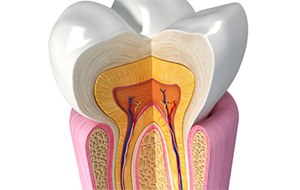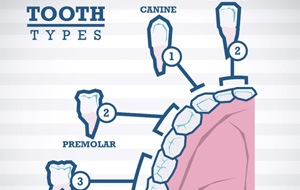Root Canal Therapy – Jacksonville, FL
Root Canals Help You Save Damaged Teeth!

Teeth can be damaged in a number of ways. Sometimes life happens and you find yourself in a serious accident with a badly damaged tooth. Other times, oral hygiene gets pushed to the wayside and a cavity forms but never gets treated. Regardless of how it happens, you never want to have to deal with a damaged tooth and the very real possibility of needing an extraction.
With root canal therapy, you don’t have to settle for extracting teeth just yet. Dr. Tim Bradberry and Dr. William D. Baxter can get your tooth back to normal. Contact their office to get your tooth treated!
What is a Root Canal?

Root canals refer to both the treatment and the area of the tooth where the treatment is performed. They are a restorative procedure designed to remove damaged and decayed tissue, cure the infection within the inner tooth and cap the tooth to protect it from future infections. They are considered to be a common procedure performed by dentists around the country and have an incredibly high success rate. Treatment is usually completed in a single appointment thanks to our office’s advanced crown fabrication technology CEREC. In just one visit, you can have your treatment performed and have a permanent crown ready to place on top of the affected tooth!
Why Do I Need a Root Canal?

As plaque develops, it becomes a more calcified form known as tartar. Plaque and tartar destroy enamel slowly over time and create cavities that expose the inner layers of teeth. Once enough damaged has occurred inside the inner tooth where the pulp and nerve endings are, it can become infected by bacteria inside the plaque and tartar. This infection has the potential to be extremely dangerous not just to your oral health, but your overall health as well. At this stage, it’s likely that you’re experiencing significant pain as well. If you want to save your tooth, remove this pain and get your oral health back on track, a root canal will be needed.
Does a Root Canal Hurt?

Contrary to popular believe, root canals are designed to remove pain, not cause it. The discomfort you may be familiar with is tied to how patients feel before and after treatment. For most, root canal therapy is no more painful than a dental filling. During treatment, your tooth and surrounding gum tissue is completely numb, so there’s no risk of feeling pain during the treatment itself.
Recovering from a Root Canal

Root canals are meant to be minimally invasive and considered to be non-surgical, but that doesn’t mean you shouldn’t set aside time for recovery. After you complete treatment, you’ll want to rest for the remainder of the day and avoid eating foods until the numbing anesthetic begins to wear off. Take over-the-counter or prescription medications to ease any soreness and apply a cold compress to your cheek to reduce any swelling. If you still experience pain or swelling for more then two days, contact our office right away.
Understanding the Cost of Root Canals

The cost of a root canal in Jacksonville can vary for each patient. It depends on the complexity and severity of the case at hand. Our team will be sure to provide you with an honest price estimate before we start to work on your smile. Rest assured that even though this procedure can be costly, it is a wise investment in your oral health because the priority should always be to preserve your natural tooth when possible.
Factors That Can Affect Root Canal Cost

When you come in for your appointment with your emergency dentist in Jacksonville, we will examine your mouth before providing a cost estimate for your root canal. Some factors that could influence its pricing are:
- The type or location of the tooth. Incisors generally range from $300-1,000. Premolars are usually in the range of $400-1,800 as compared to $500-2,000 for molars. Pricing is directly related to how involved the treatment is – molars have multiple roots while incisors only have one.
- The complexity of the case. Depending on the difficulty of the procedure, it might be necessary to involve a specialist. They may operate under a different price structure than we do.
- Additional services are involved. For example, a dental crown may be recommended to help protect and fully restore your tooth. A crown means an additional expense, and the cost will depend on the type of tooth.
Is It Cheaper to Pull My Tooth?

If money is tight, you might be tempted to go for a tooth extraction instead of root canal therapy. It is true that in the near term, removing a tooth is less expensive than preserving it. However, a root canal can certainly be more affordable in the long run. Not only can it spare you from having to pay for tooth replacement but keeping your natural teeth can also prevent future dental issues that would incur further expenses.
The longer you wait to get a root canal, the more likely it is your tooth will have to be removed. Then, concerns with your bite being impacted to cause discomfort and difficulty eating enter the picture.
Does Dental Insurance Cover Root Canal Therapy?

Most dental insurance plans do cover root canal therapy. It is usually classified as a major procedure, meaning that 50-80 percent of the cost may be covered up to the amount of your plan’s annual maximum. You will need to examine your policy’s details to know for sure how it applies. Our practice welcomes insurance, and we are in-network with several major plans. We will be happy to verify your coverage, file your claims paperwork, and help you understand your benefits.
Another Option to Make Root Canal Therapy Affordable

We can help you break up the cost of your care into smaller, easier-to-manage monthly payments with CareCredit. This is a great way to help your dental care fit comfortably into your budget. If you are approved for their six- or 12-month plan and make all your payments on time, you will not be responsible for any interest!
Root Canal FAQs
How Will I Know If I Need Root Canal Therapy?
The only way to know for sure is to visit our office for an examination. We can take an X-ray of the affected tooth and check for signs of dental pulp damage. Symptoms that might indicate that you need a root canal can include severe tooth pain whenever you bite chew, prolonged sensitivity to temperature, discoloration of the tooth, swelling and tenderness in nearby gums, and a pimple-like bump forming on the soft tissues inside your mouth. Note that sometimes there will be no noticeable symptoms; in these cases, the infection will most likely be found during a routine checkup.
How Successful is Root Canal Therapy?
A successful root canal treatment is defined by successfully stopping the spread of an infection and preserving the damaged tooth. To that end, the treatment has a very high success rate of over 95 percent. In many cases, teeth that have been treated with root canal therapy can last a lifetime. Don’t worry about the appearance of the tooth afterwards; a crown or a filling will be placed in order to protect the area, and it will be made out of a tooth-colored material that blends in with the rest of the enamel, making it look like it’s simply a natural part of the dental structure.
Can There Be Complications After a Root Canal?
Sometimes a new infection might occur after root canal therapy is performed. For example, if there’s a crack in the tooth that isn’t repaired, bacteria can slip past the enamel again. A damaged or lost restoration could also invite a new infection. If that happens, schedule an appointment with us right away. In some cases, it’s possible to treat the new infection with endodontic retreatment. Remember that with any type of infection, treatment is much more likely to be successful if you act quickly instead of putting it off.
How Long Will a Root Canal Take?
It depends somewhat on how complex the treatment is. The average treatment is around 30 to 60 minutes, but it could be as long as 90 minutes for more extensive infections or teeth that have a complex network to clean. Usually only one to two appointments are needed; it depends on how much time it takes to place filling material or a dental crown. Oftentimes, we’ll need to give your mouth time to heal before we can permanently attach the dental crown.
